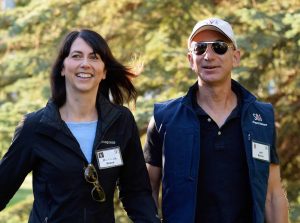Different style of philanthropy: MacKenzie Scott and Jeff Bezos.

MacKenzie Scott, an author and the world’s third-richest woman, has donated $4.2 billion to 384 nonprofit organizations. Her announcement began with a poem by Emily Dickinson. Then Scott wrote: “This pandemic has been a wrecking ball in the lives of Americans already struggling. Economic losses and health outcomes alike have been worse for women, for people of color, and for people living in poverty. Meanwhile, it has substantially increased the wealth of billionaires.”
Scott recognizes the uneven impact of COVID-19 across social groups and its contradictions: immiseration of many co-occurring with wealth expansion of few. To correct this, some might want the government to redistribute these super-normal wealth gains. For others, and in the spirit of Andrew Carnegie, redistribution is best done by private action.
Identifying Beneficiaries
But who should benefit from this redistribution?
Scott has clear priorities: tackling short-term and long-term inequities. She supports organizations that provide food aid, debt relief, employment training, legal representation, and education to historically marginalized people.
In terms of process, Scott’s advisors began with 6,490 organizations. They then took a deep dive into the shortlisted 822 and eventually funded 384. Scott notes that these organizations have strong leadership, “with special attention to those operating in communities facing high projected food insecurity, high measures of racial inequity, high local poverty rates, and low access to philanthropic capital.”
We find the focus on “low access to philanthropic capital” to be revealing. MacKenzie Scott recognizes inequities in society. But she also recognizes inequities among actors who are supposed to tackle societal inequities and does not want her philanthropy to reproduce them. This is a remarkable strategy. In recent years, the NGO sector has come under criticism for various reasons, including how a handful of NGOs are dominating it and imposing their priorities on the beneficiaries they are expected to serve. In addition, the domination of the few means that the space for grassroots, community-driven actors is shrinking. MacKenzie Scott wants to correct this trend, or at least not perpetuate it. This gives a glimpse into her “theory of change,” where local, community-based organizations are at the forefront in providing food security or combating poverty in local communities.
How did Jeff Bezos Donate?
In November 2020, Jeff Bezos, MacKenzie Scott’s former husband, announced grants totaling $791 million. Unlike Scott, he funded 16 organizations. Further, he allocated about three fourths of donations to five organizations: The Environmental Defense Fund, The Nature Conservancy, Natural Resources Defense Council (NRDC), the World Resources Institute, and the World Wildlife Fund — each getting $100 million!
Unlike Scott, Bezos is focusing on climate issues. He is funding projects such as satellite tracking of methane emissions, electrification of school buses, protection of the Emerald Edge coastal rainforest, and restoration of mangroves. The NRDC is an exception because Bezos’ grants will support its political advocacy in general instead of advocacy for a specific cause (such as the Sierra Club’s Beyond Coal Campaign, which Mike Bloomberg funded).
Different Styles of Philanthropy
Scott and Bezos are not impulsive philanthropists. Their advisors have pored over lots of data to identify the beneficiaries. Yet, they fund different causes and organizations. Why so and what does this reveal about their priorities?
Philanthropy is intensely personal because it often reflects donors’ philosophies and life experiences. Andrew Carnegie created, among many things, a national network of public libraries. This was perhaps motivated by his experience as a young immigrant, who benefited from Col. Anderson’s generosity of allowing working men to access his personal library.
But what is their calling? Scott, an author, seems to have been inspired by Emily Dickinson’s poetry. She is sensitive to the widespread economic and social disruption caused by COVID-19. Her philanthropy delivers immediate relief to the underprivileged (though she also funds capacity building). She spreads her donations across a large number of organizations, many of them relatively unknown. These organizations view social inequities as structural problems and not as technological ones.
Bezos, in contrast, is a believer in technology. He funds big projects undertaken by visible actors with high access to philanthropic capital. Bezos’ philanthropy also has an instrumental dimension because it coheres with Amazon’s recent climate initiatives.
The donations by Scott and Bezos raise important questions about the responsibilities of the wealthy in an increasingly unequal society. They reveal that how we give reflects our priorities, beliefs, and the theory of change. But the scale of these donations also raises the issue of democratic deficit and how a few wealthy individuals are shaping how societies address critical challenges.